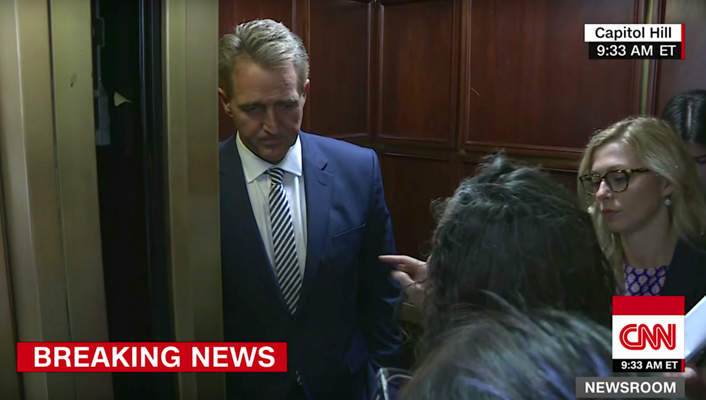The male-female divide in Australia and the US is now wider than ever.

Senator Jeff Flake, who ultimately supported Kavanaugh’s nomination, faces Maria Gallagher in the US Capitol. PHOTO CNN
Australia and the US are both frontier societies, it is said. In both cases, people came from overseas and fought to win control of the land, against adversaries both human and non-human.
In such a situation the male way of doing things predominates. Men build the fences, railways and all the paraphernalia of power, and deal with opponents physically and aggressively.
But old habits are hard to shake. Just after Malcolm Turnbull was forced out of office, a number of women Liberal MPs strongly criticised aggressive behaviour by their male colleagues in the lead-up to the party-room vote. Victorian MP Julia Banks said she wouldn’t stand at the next election, Senator Lucy Gichuhi threatened to name culprits, and former deputy leader Julie Bishop called for a more female-friendly parliament.
In Canberra, as in most parliaments around Australia, Liberal women have always been a small, not very vocal minority in their party. To come out in public and accuse some male colleagues of bullying is a significant departure from normal. They must have been seriously bothered.
In the push-back, Craig Kelly MP advised Banks to “roll with the punches” and Victorian party president Michael Kroger thought complainants should “toughen up”. Alan Jones, who knows a thing or two about bullying, said on 2GB there was “no substantive proof” that it had happened.
Prime minister Scott Morrison doesn’t seem to have an opinion, but he has everything to lose from yet another internal brawl. His plan is to avoid any further offence by keeping it all in house.
Accusations by women that men have behaved aggressively toward them are not confined to the Liberal Party – the Nationals, Labor and the Greens have all seen similar issues raised this year – nor to Australia.
The gender divide in the United States turned into a chasm last week during an angry Senate hearing to confirm Donald Trump’s nominee for a Supreme Court vacancy. Federal court judge Brett Kavanaugh was accused of a drunken sexual assault, when he was 17, on a 15-year-old girl.
Trump, who has some interesting history of his own around women, mocked the testimony of Kavanaugh’s accuser, Christine Blasey Ford, branding her and other Kavanaugh opponents as “evil people” out to destroy the judge and his family.
As the hearing drew to a close, Republican Senator Jeff Flake was cornered in a lift as a couple of women, each of whom said she was a victim of sexual assault, angrily accused him of not taking their experience seriously enough. Their names were Ana Maria Archila and Maria Gallagher.
Trump later tweeted about “very rude elevator screamers” whom he claimed were “paid professionals”. The two were loud, and they insisted on being heard, but calling them “elevator screamers” was insulting. Both women said they had received no money for their efforts.
I watched Ford’s full testimony on video (and Kavanaugh’s testy response) and the astonishing scene at the lift as Jeff Flake tried to get away. Of course women are capable of deceiving, but I’ve been around long enough to know fake when I see it. This was not fake.
None of this made any difference to the final Senate decision. The Republican majority confirmed Kavanaugh’s appointment for life, a decision stitched up long ago to cement a conservative majority on the Supreme Court. Just five of the 50 yes votes were by women.
This was a momentous outcome, representing a huge boost for the power of corporate America and the anti-abortion movement. In the US and around the world, its impact will be felt for decades.
A large part of the impact will fall on the rights of women, who came out in large numbers at the weekend to protest the Senate vote. I can remember no previous time, going back to the 1960s, when US gender politics has been so fraught. It may change the nation in unexpected ways.
Learning how to deal with the opposite sex is part of growing up. Most men come to understand women’s fundamental right to take part in public life, at any level, and to realise their value in the workplace. Needless to say, they deserve the same courtesy and respect as a man.
The culprits in the above shenanigans – the Canberra bullies and Kavanaugh’s backers in the US – seem never to have left the frontier. Oblivious of the damage they are doing, they see nothing wrong in treating with contempt women’s remembered experiences and righteous anger.
There will be payback. If women perceive injustice and constantly feel thwarted in having it addressed, it should be remembered that they make up half the electorate, and they vote. In the US, where voting is voluntary, they come out in greater numbers than men.
Women’s full, open and unfettered participation in the processes and institutions of democracy is a cornerstone of civil society. By trivialising them and riding roughshod over their legitimate protest, these ignorant, greedy bullies are doing us all an injustice.
